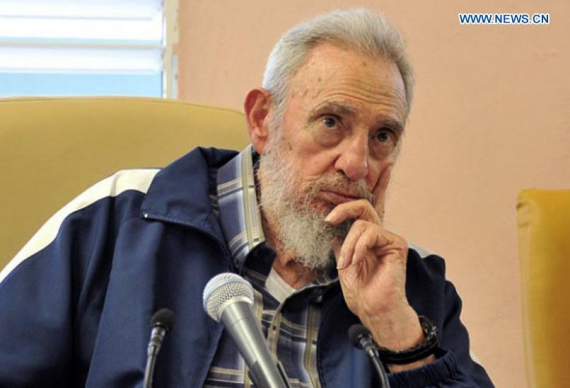
File photo taken on April 11, 2013 shows Fidel Castro attending the inauguration of a school in Havana. Cuban revolutionary leader Fidel Castro has died at 90, local media said on Nov. 26, 2016. (Photo: Xinhua/Cubadebate)
With music, alcohol sales and baseball games suspended, Cuba's capital Havana has been immersed in grief and silence in a nine-day period of mourning after Cuban revolutionary leader Fidel Castro passed away late Friday at the age of 90.
"With deep sorrow I report to the Cuban people that our beloved leader Fidel Castro passed away at 10:29 p.m.(0329 GMT Saturday) on Friday," said President Raul Castro in a statement broadcast on Radio Reloj.
In an official statement published by the Communist Party newspaper Granma, the organizing committee of Fidel Castro's funeral said his ashes will be buried at the Santa Ifigenia cemetery in the eastern city of Santiago de Cuba, the resting place of independence hero Jose Marti and other leading figures of the island, on Dec. 4 after Cubans from all over the island pay their tributes to the late leader.
A national tribute to Fidel Castro is scheduled to take place on Monday, at the Jose Marti Memorial in Revolution Square in Havana, local officials told reporters.
The ceremony will begin with the firing of a 21-gun salute, according to a government statement.
The Jose Marti Memorial, which will temporarily house Castro's remains, is at the highest point of Havana. It stands on Revolution Square, long held to be one of Cuba's most emblematic spots.
For decades, it hosted massive demonstrations in support of the Cuban Revolution and Castro gave many of his most important speeches there.
On Tuesday, Revolution Square will also host a public mass for Cubans to pay their respects.
Following that, the ashes will begin a 1,000-km trip from Havana to Santiago de Cuba. This journey will be the reverse of the one Castro carried out, as a young guerrilla leader, in his Caravan of Liberty in 1959.
Besides preparations for the official commemoration, hundreds of thousands of people turned out across the nation during the weekend waving flags and chanting slogans in Castro's honor.
Juan Rodriguez, a young Cuban, said: "(Fidel) was the greatest person for Cubans. He was man that always took care of Cubans, protected them and always thought about Cuba."
During the period of mourning, sports and cultural activities are suspended, while flags remain at half-mast. State television broadcasts non-stop tributes to Castro's accomplishments and newspapers are printed in black ink in memory of the man who led the country for decades.
Fidel Castro led the 1959 Cuban Revolution that overthrew Cuban dictator Fulgencio Batista and was one of the main political opponents of the United States.
In a letter he wrote in 1958, prior to his victory in Cuba, Castro presciently stated that "when I finish this war, I will begin a far larger and greater war...the war in which I will fight against (the United States). I have realized that will be my true destiny."
A few months later, in January 1959, Castro installed a socialist society only 150 km from American shores and stood firm for decades, surviving 11 U.S. administrations and hundreds of assassination attempts.
Hostilities between the two sides began when the new revolutionary government approved an agricultural revolution which Washington opposed. The U.S. government responded by stopping sugar purchases from Cuba and halted diplomatic ties, closing its embassy in Havana in January 1961.
The island, which depended on the North American sugar market for much of its revenue, responded by nationalizing American properties, which ratcheted up tensions with the Eisenhower administration.
Months later, Castro led the resistance in April 1961 and repelled the Bay of Pigs Invasion, organized by then President John F. Kennedy.
In February 1962, Kennedy installed a total embargo against Cuba with the Cuban Missile Crisis later that year bringing the world to the brink of nuclear warfare after the Soviet Union installed nuclear missiles in Cuba.
The disintegration of the Soviet Union robbed Cuba of its main ally, allowing the administration of George Bush to strengthen the embargo between 1989 and 1993.
In July 2006, Castro fell gravely ill, which forced him to hand over power to his younger brother, Raul.
After stepping down from the presidency, Castro remained politically active. In March 2007, he began his column, "Reflections of Comrade Fidel," and eventually wrote over 400 articles, often slamming imperialism and American foreign policy.
Under the Obama administration, the United States and Cuba reestablished diplomatic ties in December 2014.
But many fear that US President-elect Donald Trump will reverse Obama's opening-up to the island.


















































